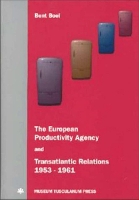


|
|
|
books
| book details |
The European Productivity Agency and Transatlantic Relations 1953-1961
By (author) Bent Boel

|
This book is currently unavailable. Enquire to check if we can source a used copy
|
| book description |
The EPA was created in 1953 as a semi-autonomous organisation within the framework of the Organisation for European Economic Co-Operation and wound up eight years later, in 1961, when the US and Canada joined the OEEC countries and founded the Organisation for Economic Co-Operation and Development. The EPA was the product of American ideas, actions and money. It embodied the merger of two main US foreign policy goals after World War II, increasing productivity and furthering integration among the countries of Western Europe. The agency was conceived as a major instrument for the 'politics of productivity' which would enable Western European societies to overcome their social and political problems resulting from scarcity, particularly in countries such as France. During its short-lived existence the EPA acted as an operational arm of the OEEC, accounting on average for over 40 percent of the overall OEEC expenditures. It implemented a vast array of activities aimed at improving productivity in industry, commerce, agriculture and distribution. Many of its projects met with contrasted reactions and thus highlighted conflicts between trade unions and employers, differences amongst the OEEC countries as well as transatlantic squabbles. The EPA was designed as a means to 'Americanise' Western Europe through the transfer of American techniques, know-how and ideas to the Old Continent. It increasingly became a framework within which the member countries sought 'European' solutions to their problems. This study sheds new light on the nature of European co-operation and transatlantic relations in the I950s as well as on the changes these relations underwent. Bent Boel, is Assistant Professor, Department of Languages and Intercultural Studies, University of Aalborg.
| product details |
Normally shipped |
Publisher | Museum Tusculanum Press
Published date | 4 Dec 2003
Language |
Format | Paperback / softback
Pages | 294
Dimensions | 250 x 150 x 15mm (L x W x H)
Weight | 666g
ISBN | 978-8-7728-9673-1
Readership Age |
BISAC | business & economics / general
| other options |
|
|
|
To view the items in your trolley please sign in.
| sign in |
|
|
|
| specials |
|

|
Mason Coile
Paperback / softback
224 pages
was: R 520.95
now: R 468.95
|
A terrifying locked-room mystery set in a remote outpost on Mars.
|
|
An epic love story with the pulse of a thriller that asks: what would you risk for a second chance at first love?
|
|
|
|
|